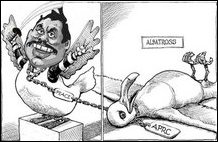Ilankai Tamil Sangam28th Year on the Web Association of Tamils of Sri Lanka in the USA |
|||||||||||
 Home Home Archives Archives |
APRC: Key to Peace or an Albatross?by TamilNet, January 20, 2008
On the 13th Amendment, the LTTE said in 1988, "With Presidential authority exerting rigid control over the functions of the Provincial Councils, the powers accorded to Parliament to amend or repeal the chapter pertaining to the P.C's make this 'devolution package' a mockery.
"The legislative powers devolved to the Councils become meaningless and impotent since Parliament retains the power to legislate even on matters allotted to Provincial Councils. In brief, the provisions of these Bills, having effectively constrained devolutional power, allow the perpetuation of the tyranny of the Parliamentary majority which has been the medium of repressive racist policies against the Tamil people," LTTE said in its report. Now, Sri Lanka's President has given an ultimatum to the the All Party Representative Committee (APRC), appointed by him in June 2006, and tasked to produce a consensus of the South in devolving power, to deliver by the 23rd January, a proposal based on the 13th Amendment.
Rajapakse aims to achieve two political objectives with this effort. First, he intends to placate India and to encourage a visit by the Indian Prime Minister to attend the 4th February Independence day celebrations. Secondly, Colombo is under severe international pressure to present a political solution to the Tamils, the abrogation of the CFA by Colombo making this matter even more urgent. Rajapakse appears to believe that this effort will help to convince the international community of the bona fides of his peace motives.
Sumanasiri Liyanage who teaches political economy at University of Peradeniya says in a recent article: "Although the full implementation of the 13th Amendment is a positive step, this proposal is a backward one. Why? For two reasons. First, the full implementation of 13th Amendment today means something less than the 13th Amendment of 1987 because of the Supreme Court decision to de-merge Northern and Eastern provinces. Secondly, many powers initially devolved to the provincial councils have already been taken back by the center government. Now the provincial councils have lesser number of schools, hospitals, and many other institutions."
Ms. Satchithanantham, a prominent civil activist, echoes this view, and doubts the ability of Colombo in genuinely implementing any proposal, and says there is no political will to even sorting out the "concurrent list" in the 13th Amendment to fully devolve power.
The provisions of the 13th Amendment are impossibly "burlesque and farcical," Satyendra says. While derisively calling the Provincial Governor, the Provincial Board of Ministers with a Chief Minister, and the Provincial Council "a trinity of marvels, he adds, "In sum, executive power in relation to provincial matters, will be exercised by a Governor who will be appointed by the President, who will hold office 'during the pleasure' of the President, and who will exercise his executive powers as the faithful and loyal servant of the Executive President of Sri Lanka. That is the naked political and constitutional reality of the character of a Provincial Governor under the 13th Amendment."
Late Dharmeratnam Sivaram, a popular military analyst, and senior editor at TamilNet, said the 13th Amendment did not provide even a "loin cloth" to the Tamils even after a decade of its existence. External Links:
| ||||||||||
